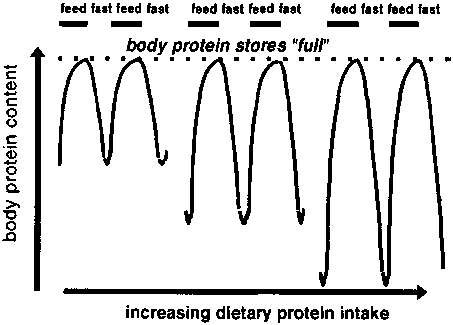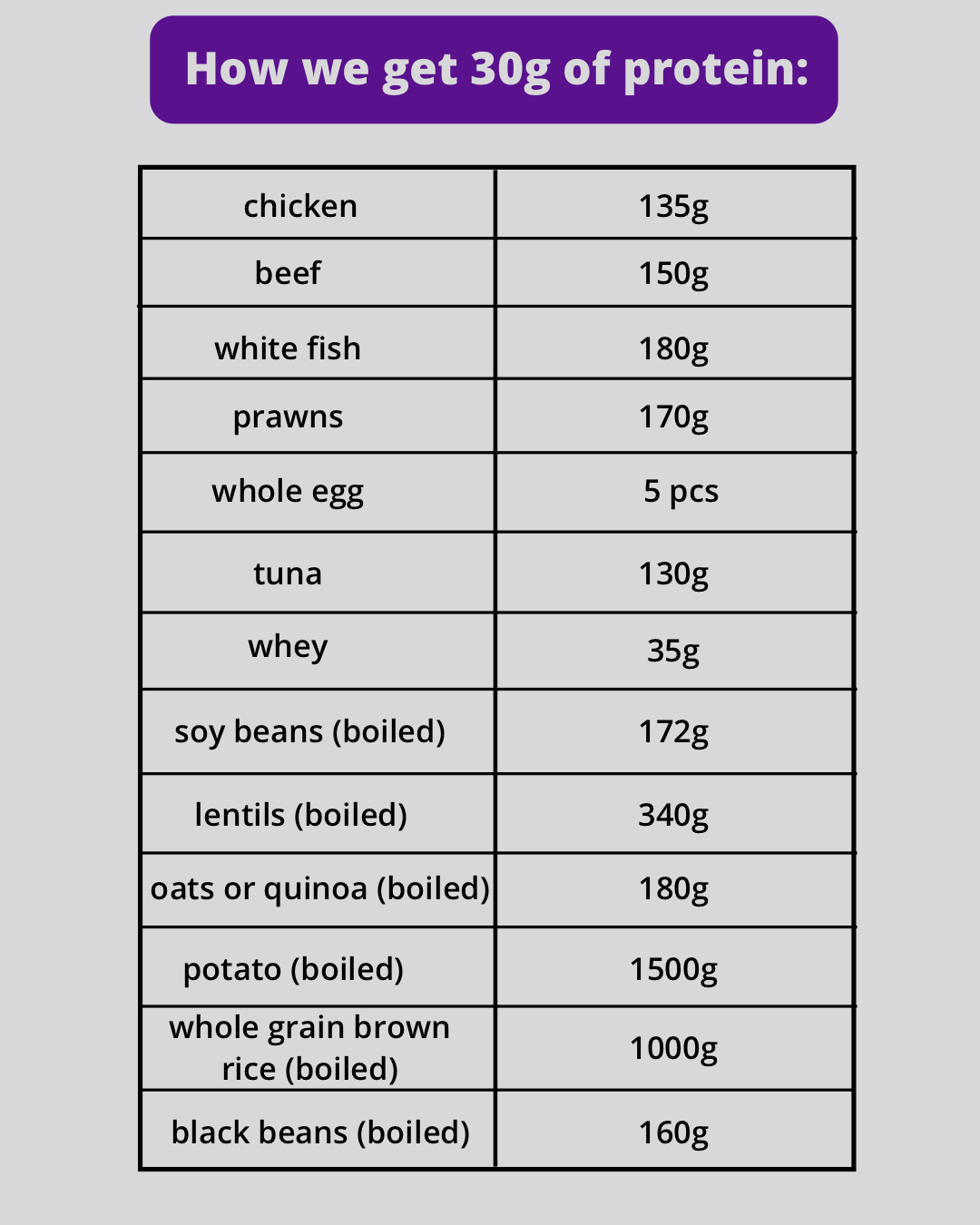Surprised? Let's have a look at it together.
What did you have for breakfast today? Was a hand-sized piece of fish or meat part of it, or maybe you had a scramble made of 4 eggs? No? Okay, let's check what you had for lunch. Was it pasta? Alright, not too bad. And how much protein was there? Not sure? Yeah, I understand. It’s difficult to gauge. Okay, and what about dinner? A light salad with a piece of grilled chicken? Nice! At least one in the books!
“ But I feel perfectly fine eating this much!” — you might think at this moment.
See, protein isn't only for bodybuilders or weightlifters (keep reading if you are, though). If you are not an athlete or an endurance athlete, you will still greatly benefit from enough protein intake.
Think of protein like bricks in your body that build your muscles. You need them for so much more than just showing off on social media!
On top of that, our bodies need protein to produce new cells, fight inflammation, strengthen the immune system, and secure smooth chemical signalling between the body and the brain.
Okay, so far so good.
Let's dig deeper. Muscles are made of protein, and what is protein made of?
Amino acids.
This means that our bodies consist of amino acids too. However, not all amino acids are equal.
Animal proteins, such as meat, fish, eggs, and milk, are complete protein sources that provide all of the essential amino acids our bodies need. Plant-based proteins aren't complete (except soy, quinoa, and amaranth) and tend to contain low amounts of essential amino acids.
That's why diversity in food matters, especially if eat plant-based foods.
So, how much protein do we need?
The basic recommendation for protein intake is 0.8 g per kg of body mass for generally healthy adults. For instance, a 75 kg person should consume 60 g of protein daily, which is the equivalent of approximately 200g of meat or fish, or around 600g of lentils for those opting for plant-based nutrition.
But wait, there’s more.
This recommendation is the minimum to prevent deficiency — feelings of fatigue, muscle weakness, difficulty recovering from workouts, poor concentration, slow wound healing, and a general sense of low energy, to name only a few.
When we’re aiming for optimal functioning of the immune system, metabolism, weight management, satiety, recovery, and eventually a better performance, we need more protein.
How much more?
Here, the information varies. Some sources suggest that active individuals, athletes, and those on a weight loss journey need 1.4-2.0g per kg of body mass, while others recommend 1.8-2.2g per kg. Landing in the middle is a safe bet. But it's important to consider factors like your age, gender, goals, environment, and the starting point as they greatly influence your protein needs and further steps towards achieving them.
Let's assume our hypothetical 75 kg individual needs 1.8 g of protein per kg of body mass daily for optimal muscle protein synthesis, recovery, and performance. This amounts to 135g of protein daily, roughly equivalent to 450g of meat or fish or around 1.3 kg of lentils for those favoring a plant-based choice.
Does it make sense now why I think you do not eat enough protein? Seeing the numbers above, you can see that it's a lot of food.
“Yeah, but that piece of chicken I had with the salad in the evening was big enough.” — you might argue.
Sadly, having just one portion of protein a day, regardless of how big it is, won't give you all the benefits you need.
And here's why.
We can only store so much protein at a time. As you can see in the graph below, our protein levels fluctuate during the day. But the highest point on the graph doesn't get higher; the amount of protein in the body goes up and down as we eat or fast. The body needs its protein stores to be continually replenished.
What did you have for breakfast today? Was a hand-sized piece of fish or meat part of it, or maybe you had a scramble made of 4 eggs? No? Okay, let's check what you had for lunch. Was it pasta? Alright, not too bad. And how much protein was there? Not sure? Yeah, I understand. It’s difficult to gauge. Okay, and what about dinner? A light salad with a piece of grilled chicken? Nice! At least one in the books!
“ But I feel perfectly fine eating this much!” — you might think at this moment.
See, protein isn't only for bodybuilders or weightlifters (keep reading if you are, though). If you are not an athlete or an endurance athlete, you will still greatly benefit from enough protein intake.
Think of protein like bricks in your body that build your muscles. You need them for so much more than just showing off on social media!
- Muscles are not only about what you can lift in the gym but about the strength to move your body. Think walking, running, playing with your kids.
- If you’re someone concerned about pre-diabetes, then you should know that skeletal muscles are primarily responsible for glucose metabolism critical to reversing insulin resistance and preventing diabetes.
- Muscles store energy, i. e. the carbohydrates you eat. Hi, endurance athletes!
- Bigger muscles means less fat. The more muscle mass you have, the higher your BMR (basal metabolic rate). BMR refers to the amount of energy your body typically burns at rest. Muscle cells burn calories even when you're not moving because they require energy to contract and relax.
- From the time we are born till our 30s, our body is building muscle. Then, we start losing 3-8% muscle mass per decade. And guess what? Exercise and nutrition play a vital role in slowing down this process.
On top of that, our bodies need protein to produce new cells, fight inflammation, strengthen the immune system, and secure smooth chemical signalling between the body and the brain.
Okay, so far so good.
Let's dig deeper. Muscles are made of protein, and what is protein made of?
Amino acids.
This means that our bodies consist of amino acids too. However, not all amino acids are equal.
- Essential amino acids. Our bodies can't produce them, and we need to get them from food.
- Conditionally essential amino acids. Our bodies can't always produce enough of them, especially when we feel stressed.
- Non-essential amino acids. Our bodies typically produce these on their own.
Animal proteins, such as meat, fish, eggs, and milk, are complete protein sources that provide all of the essential amino acids our bodies need. Plant-based proteins aren't complete (except soy, quinoa, and amaranth) and tend to contain low amounts of essential amino acids.
That's why diversity in food matters, especially if eat plant-based foods.
So, how much protein do we need?
The basic recommendation for protein intake is 0.8 g per kg of body mass for generally healthy adults. For instance, a 75 kg person should consume 60 g of protein daily, which is the equivalent of approximately 200g of meat or fish, or around 600g of lentils for those opting for plant-based nutrition.
But wait, there’s more.
This recommendation is the minimum to prevent deficiency — feelings of fatigue, muscle weakness, difficulty recovering from workouts, poor concentration, slow wound healing, and a general sense of low energy, to name only a few.
When we’re aiming for optimal functioning of the immune system, metabolism, weight management, satiety, recovery, and eventually a better performance, we need more protein.
How much more?
Here, the information varies. Some sources suggest that active individuals, athletes, and those on a weight loss journey need 1.4-2.0g per kg of body mass, while others recommend 1.8-2.2g per kg. Landing in the middle is a safe bet. But it's important to consider factors like your age, gender, goals, environment, and the starting point as they greatly influence your protein needs and further steps towards achieving them.
Let's assume our hypothetical 75 kg individual needs 1.8 g of protein per kg of body mass daily for optimal muscle protein synthesis, recovery, and performance. This amounts to 135g of protein daily, roughly equivalent to 450g of meat or fish or around 1.3 kg of lentils for those favoring a plant-based choice.
Does it make sense now why I think you do not eat enough protein? Seeing the numbers above, you can see that it's a lot of food.
“Yeah, but that piece of chicken I had with the salad in the evening was big enough.” — you might argue.
Sadly, having just one portion of protein a day, regardless of how big it is, won't give you all the benefits you need.
And here's why.
We can only store so much protein at a time. As you can see in the graph below, our protein levels fluctuate during the day. But the highest point on the graph doesn't get higher; the amount of protein in the body goes up and down as we eat or fast. The body needs its protein stores to be continually replenished.

So, considering this, I'd recommend splitting your total daily protein intake into 3 to 4 servings of at least 30-40g each.
Why this much?
Most of the (animal) food contains 25-30g of protein per 100g of product. And there is evidence that 40g of protein stimulates muscle protein synthesis to a greater degree than 20g.
Here's a list of foods that might come in handy when choosing your meals.
Why this much?
Most of the (animal) food contains 25-30g of protein per 100g of product. And there is evidence that 40g of protein stimulates muscle protein synthesis to a greater degree than 20g.
Here's a list of foods that might come in handy when choosing your meals.

Key takeaways:
If you have comments or questions, you can always reach out to me over email or slide into my DM on Instagram.
- Amino acids -> protein -> muscles -> energy storage, recovery, performance, weight control
- Protein should be an essential part of every meal
- Consume not less than 30g of protein per meal
- Split protein consumption into 3-4 meals a day
If you have comments or questions, you can always reach out to me over email or slide into my DM on Instagram.
